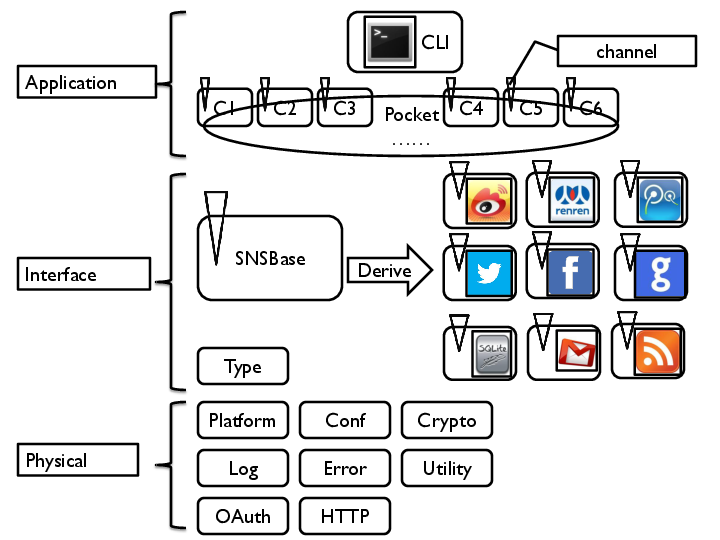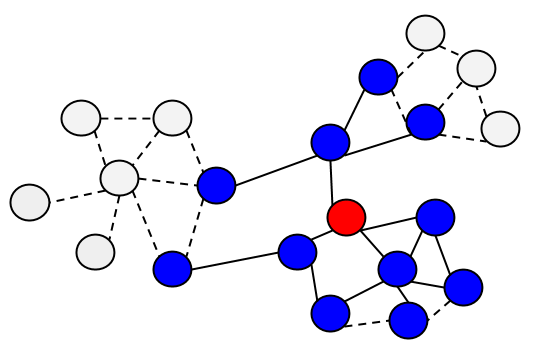Decentralized Social Networks
0. Mission Statement
Since the centralized Online Social Networks (OSN) have a lot of problems ranging from poor privacy control to low innovation speed, we pursue Decentralized Social Networks in this project. We do both system prototype and supporting algorithm design for Decentralized Social Networks (DSN).

1. A Meta Social Networking Approach
There are a lot of problems associated with centralized Social Networking Services (SNS), e.g. potential loss of accounts, poor privacy controls, etc. Many developers and researchers all over the world now agree that decentralization is the future of social networking. People from many communities have proposed different solutions to address the problem. Despite their attractive features, only a small portion of those solutions managed to jumpstart and only a few of them grow to near million level of user populations. Based on this obser- vation, we envisioned that migration is actually the grand challenge of all. The loss of links (social connections with existing friends) is preventing former centralized SNS users from moving to decentralized services (either stand-alone distributed social services or federated social services). To address the problem of migration, one urgent task is to enable flexible and programmable cross-platform socialization. Towards this end, we build a lightweight Python-based middleware to unify the interfaces and data structures of heterogeneous SNS. Unlike most prior works, this middleware is user-oriented. With zero infrastructure support (no need of server setup, database setup, etc), users can readily manipulate their social channels in a programmable fashion. After sharing our view on the future of social networking, we will briefly introduce the architecture of the middleware and demo two sample applications.
More info. can be found in the positioning paper:
-
Pili Hu
and
Wing Cheong Lau
, 2013,
A Meta Social Networking Approach Towards Decentralization
2013, Workshop on Social Standards: The Future of Business 7-8 August 2013, San Francisco, USA, Organized by W3C

2. A Cross-Platform Social Networking Middleware

|
SNSAPI
Repo maintainer: HU Pili Initiator: HU Pili, LI Junbo (@BUPT) SNSAPI aims at interfacing with heterogeneous Social Network Services easily, so as to enable application and research in a cross-platform manner. The project is open source and is hosted on Github. Issues, suggestions, and technical contributions are all welcome. Project website: http://snsapi.ie.cuhk.edu.hk |
SNSAPI adopts a modularized and layered design:
- Interface Layer (IL). Define the social network class and message class. Specific platforms derive from those base classes to implement transaction logics.
- Physical Layer (PL). Provide common building blocks for implementing different platforms, e.g. HTTP, logging, etc.
-
Application Layer (AL).
Apps can be built on IL directly.
For the convenience, we provide in AL:
- A container class: for batch operations and asynchronous operations. This facility largely reduce repeated works in developing Apps.
- A Command-Line-Interface (CLI) in form of a Python interactive shell. It can interface with any other languages via STDIN/STDOUT.

SNSAPI is flexible and programmable. It enables rapid development of client side cross-platform applications. Sample applications include SNSRouter, which provides a Web UI and a lightweight ranking framework, so that users can be more efficient in identifying and forwarding important information in a cross-platform fashion.
Publications:
-
Pili Hu, Junbo Li, Wing Cheong Lau ,
PIXS: Programmable Intelligence for Cross-Platform Socialization,
HotPlanet Workshop (co-located with Sigcomm2013), Aug 2013.

-
Pili Hu, Qijiang Fan, Wing Cheong Lau ,
SNSAPI: A Cross-Platform Middleware for Rapid Deployment of Decentralized Social Networks,
2014, http://arxiv.org/abs/1403.4482

3. Community Detection on DSN
Community detection under DSN scenario is constrained by limited information. In previous distributed community detection works, nodes usually exchange considerable amount of information. While being effective for certain type of P2P or DTN systems, those algorithms can not be directly used under a social networking scenario, because privacy is a major concern.
Without excessive trust between DSN nodes, our past and on-going investigations include:
- Community detection using only local information.
- Secure and private protocols to allow nodes collectively detect communities.

Publications:
-
Pili Hu and Wing Cheong Lau ,
Community Classification in Decentralized Social Networks Using Local Topological Information,
IEEE Globecom, 2014.

-
Pili Hu, S.M. Chow and Wing Cheong Lau ,
Secure Friend Discovery via Privacy-Preserving and Decentralized Community Detection,
ICML 2014 Workshop on Learning, Security and Privacy, 2014.


